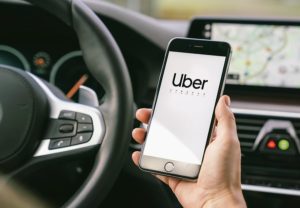Uber’s ridesharing service promises convenience, cleanliness, and safety. Unfortunately, ridesharing can endanger Uber passengers, other motorists, and pedestrians. Some of these accidents are minor, but others result in serious, or even fatal injuries.
Because Uber and similar services are relatively new in the legal world, when an accident occurs, complicated and confusing issues may arise.
If you suffered injuries in an Uber accident, consult a South Carolina Uber accident lawyer at the Hughey Law Firm as soon as possible for a free consultation.
Uber Presents Unique Legal Challenges
The ridesharing market is projected to grow from a market size of $61.3 billion in 2018 to $218 billion by 2025. Among other factors, the growth of rideshare companies is fueled by the demand for convenience, a decline in car ownership, and growing smartphone use. According to the Pew Research Center, the share of Americans who have used ridesharing services has more than doubled during the last few years. The two most popular services are Uber and Lyft.
According to its website, Uber is available in more than 80 countries and has 91 million monthly active riders. Uber is available across South Carolina. The demand for Uber rides is highest in cities, but the company continues to grow and the market continues to expand.
Ridesharing services—also known as transportation network companies (TNC)—are similar to taxi services, but there are some important differences. Each rideshare company has an app which users download on their phone to use when they need to request transportation. A prospective passenger uses the app to request the type of service they want and to insert their destination. The app uses the GPS on the user’s phone to locate the user and match them with the nearest available driver. Ridesharing companies do not fall under the same regulatory and licensing requirements that govern traditional taxi companies.
While both taxis and rideshare services create rates depending on time and distance traveled, in most cities, the Uber app calculates your cost or estimated fare range in advance. Another difference between rideshare companies and taxis is how they determine the cost of a ride. Taxis take the speed and flow of traffic into consideration. Rideshare services do not. However, they may have surge rates, particularly during rush hours.
Uber’s drivers use their own vehicles and Uber considers independent contractors, which affects their pay, benefits, and insurance coverage requirements. Their status at the time of an accident also affects the insurance coverage you may receive (if any) through Uber’s insurance policy.
Uber drivers are not subject to the same rigorous screening as taxi drivers. However, rideshare services do allow both drivers and passengers to rate and review each other for future reference.
Uber’s Insurance in South Carolina
 South Carolina is an “at fault” state for insurance. Therefore, if a driver is negligent, causes an accident, and someone is injured as a result, the person at fault is responsible for damages to the injured party. An injured person may file a South Carolina Uber accident suit to seek damages for their injuries. Fault is a key issue in these lawsuits.
South Carolina is an “at fault” state for insurance. Therefore, if a driver is negligent, causes an accident, and someone is injured as a result, the person at fault is responsible for damages to the injured party. An injured person may file a South Carolina Uber accident suit to seek damages for their injuries. Fault is a key issue in these lawsuits.
An Uber driver must have car insurance covering both their passengers and other drivers involved in the car accident. Additionally, in South Carolina, Uber vehicles are also covered by insurance policies held by Uber. Drivers must also carry their own personal insurance for the instances where they are not driving for hire.
Uber’s drivers are typically considered independent contractors, rather than employees of Uber. This is an important distinction when determining liability for injuries and damages caused by an accident. Uber carries $1 million in liability insurance. However, that liability insurance is not always applicable.
Different insurance liability rules apply in different situations.
- Because an Uber driver is using their own vehicle, it is essential to determine whether they were working or not at the time of the accident. If the driver is offline, meaning the app is off, the driver is not working and the driver’s personal auto insurance covers them.
- The coverage requirements when the driver is logged in to the app, but is not engaged in a prearranged ride include primary auto liability of at least $50,000 for death and bodily injury per person; $150,000 for death and bodily injury per incident; and $25,000 for property damage. While insurance from Uber is an option, a driver’s personal insurance will be used as the primary insurance.
- When the driver has been paired with a passenger and is on the way to pick up the person, the rideshare company’s auto insurance is typically in force. During this time, some personal rideshare insurance policies extend coverage as well.
- A driver with a passenger in their vehicle will also give rise to Uber’s $1 million liability insurance.
Minimum Uber Car Requirements
- 15-year-old vehicle or newer (requirements vary from city to city).
- 4-door vehicle.
- Good condition with no cosmetic damage.
- No commercial branding.
- Display an Uber decal at all times.
- Pass a vehicle inspection within 30 days of taking your first trip.
Registration
Uber accepts both official and temporary registration documents. The vehicle does not need to be registered in your name to qualify.
Uber Driver Requirements
Uber Driver Age Requirements
- Drivers must be 21 years of age or older.
- Drivers must have three years of driving experience. If a driver recently moved from another state, he or she may have to verify their driving history.
Other Uber Driver Requirements
- Drivers must have in-state car insurance in their name.
- Drivers must have in-state car registration.
- Drivers must have an in-state driver’s License.
- Drivers must have a Social Security number to complete the background check.
Background Check
- Clean driving record.
- Pass a background check.
The background check ensures that in the past seven years, the driver has not had:
- DUI or drug-related offenses.
- Incidents of driving without insurance or license.
- Fatal accidents
- Record of reckless driving.
- Criminal history.
Common Causes of Ridesharing Accidents
 In a recent report, South Carolina was ranked number six among the states with the most car crashes.
In a recent report, South Carolina was ranked number six among the states with the most car crashes.
What causes those accidents?
- Inattentive drivers. Rideshare drivers are subject to frequent distractions. They may be watching their GPS, watching the app for prospective passengers, or looking for passengers they have been sent to pick up.
- Sudden or illegal U-turns may cause a T-bone accident.
- Unsafe lane changes.
- Speeding.
- Drunk driving or driving under the influence of a narcotic substance.
- Driver fatigue. Rideshare drivers often drive for long hours without sufficient rest. Driver fatigue is as dangerous as driving while under the influence of an intoxicating substance.
- Failure to properly maintain the vehicle. Some drivers may not invest the time or money into maintenance and necessary repairs, to receive as much money as possible.
- Failure to obey traffic signs and signals.
- Unsafe lane changes.
- Tailgating.
- Aggressive driving. Like all drivers, in some circumstances, drivers may cross the line into aggressive driving or deadly road rage.
Common Uber Accident Injuries
Here are just a few of the more common types of injuries that can result from a ridesharing accident:
- Traumatic brain injury (TBI) – Traumatic brain injuries often occur as a result of car accidents. According to the Centers for Disease Control (CDC), a TBI disrupts normal brain function. The victim of a TBI may require continuous, long-term care.
- Spinal cord injury – A spinal cord injury is a devastating injury that affects the body’s ability to move and feel. Life may never be the same. Treatment and adaptive equipment may be disastrously expensive.
- Internal injuries – The symptoms of internal injuries may not show up for days or even weeks. But, if left untreated, internal injuries can be extremely dangerous.
- Broken bones – A serious car accident can result in one or more broken bones, leading to pain and limited mobility.
South Carolina Rideshare Accident Claims
The law regarding Uber accidents is complicated because Uber considers its drivers independent contractors rather than employees. However, it is still possible to receive compensation for your injuries. If the Uber driver is at fault for the accident, you may be able to seek compensation from the driver.
Also, if the accident occurs while the Uber vehicle is transporting a passenger, you may be able to collect compensation from any insurance policies offered by Uber. If another driver causes an accident with your Uber, you may be entitled to seek compensation from that driver and his or her auto insurance policy.
Sometimes, Uber drivers fail to renew their required insurance. If that is the case, you can also file a claim with your own insurance carrier if you carry uninsured/underinsured (UM/UIM) coverage. Uninsured motorist (UM) coverage in South Carolina is mandatory. Underinsured motorist (UIM) coverage is optional, but it is a good idea.
If your injuries are severe and will prevent you from returning to work, you may wish to file a lawsuit in civil court for your expenses and losses related to the injury. Keep in mind that all claims and lawsuits have filing deadlines, so it can be important to speak with an attorney without delay. The attorneys at Hughey Law Firm are here to help.
WHAT TYPE OF COMPENSATION IS AVAILABLE TO ME IF I’VE BEEN INJURED IN A SOUTH CAROLINA UBER ACCIDENT?
If you were injured in an Uber accident in South Carolina, the state will allow you to pursue the recovery of both economic and non-economic damages. Economic damages refer to a payment for the expenses you incurred as a result of your injuries.
Some expenses that are commonly claimed for the recovery of economic damages are:
- Medical expenses, including the cost of emergency treatment at the scene or in the emergency department; transport to the hospital via ambulance or air; diagnostic testing; surgical or physician services; prescription medication; hospitalization; physical therapy and rehabilitation. Assistive devices such as prosthetics, crutches, or wheelchairs are also compensable expenses.
- Lost wages if you are too injured to work or must miss work to attend injury-related medical appointments.
- Loss of future earning capacity if your injury results in a disability that renders you unable to work or to earn in the same capacity as you did before the accident.
Non-economic damages constitute compensation for the impacts that the injury has on your quality of life.
Some common examples of the impacts that victims claim in South Carolina Uber accident cases include:
- Physical pain and suffering
- Emotional distress
- Loss of the enjoyment of life
The Three Biggest Ridesharing Risks
When you decide to use Uber or another ridesharing service, you are getting into a stranger’s car. There are certain risks associated with this, and you should exercise caution. If you think you are in danger, take whatever steps necessary to ensure your safety and report the driver.
Some risks may include:
- Car and pedestrian accidents. Sitting in the back seat of a car, users may forget to think about normal traffic safety. Pay attention to where you are going and whether the driver is operating the car safely.
- Criminals. Even drivers that pass the required background checks may commit crimes. According to a recent investigation by CNN, no less than 103 Uber drivers in a four-year period were accused of abusing or sexually assaulting their passengers. At least 31 were convicted.
- Fake drivers. Criminals can pose as rideshare drivers and assault their passengers. In one well-known case in March 2019, Samantha Josephson, a student at the University of South Carolina, got into a car she mistook for her Uber and was killed by the driver within hours. The South Carolina legislature recently passed a bill, known as Sami’s Law, that requires ridesharing services to adopt digital systems that allow passengers to verify the vehicle before they get into the car. Under the law, it is illegal to sell ridesharing signs without authorization.
South Carolina Uber Accident FAQ
 Uber is a commonly used rideshare app in which individuals who need a ride can log in and get matched with a driver who is willing to take them to their destination for a fee. Proponents of rideshare technologies state that companies like Uber and Lyft are relieving traffic congestion, preventing drunk driving, and providing necessary transportation services for far lower rates than those charged by taxi companies. However, there is a dark side to rideshares when individuals are injured either as a passenger in a rideshare car or as an occupant of a car that a rideshare driver struck.
Uber is a commonly used rideshare app in which individuals who need a ride can log in and get matched with a driver who is willing to take them to their destination for a fee. Proponents of rideshare technologies state that companies like Uber and Lyft are relieving traffic congestion, preventing drunk driving, and providing necessary transportation services for far lower rates than those charged by taxi companies. However, there is a dark side to rideshares when individuals are injured either as a passenger in a rideshare car or as an occupant of a car that a rideshare driver struck.
Uber and its drivers have faced lawsuits in recent years in cases involving Uber drivers hitting pedestrians, those riding in other vehicles, and even those injured by the reckless behaviors of their drivers, such as leaving them in unsafe areas after the driver crashed into parked vehicles.
If an accident involving an Uber driver injured you, read on for the answers to some of the questions that our clients most frequently ask about Uber accidents.
How do I recover damages from a South Carolina Uber accident?
The word “damage” is a legal term that refers to a payment to compensate an injured individual for harm done. If you have sustained injuries in an Uber accident, you can recover damages related to your injuries through a lawsuit. This is a legal claim filed in civil court that seeks to prove who was liable for the accident that caused your injuries as well as to show the expenses and impacts to your life caused by the injury.
In South Carolina, injured individuals must generally file their Uber accident lawsuits within three years of the date that the accident occurred.
Are South Carolina Uber drivers required to have a special type of insurance?
Uber drivers are required to meet the state’s minimum insurance requirements, which include:
- $25,000 bodily injury per person
- $50,000 bodily injury per accident
- $25,000 property damage per accident
Uber also maintains an insurance policy on behalf of its drivers, with tiered coverage based on the activities of the Uber driver:
- When the driver is offline, and the driver’s app is off, his or her personal auto insurance provides coverage.
- When the driver is logged into the app and available to accept rides, Uber’s insurance policy provides $50,000 in bodily injury per person; $100,000 in bodily injury per accident; and $25,000 in property damage per accident. This coverage only applies if the driver’s personal insurance has refused to cover the accident or if damages exceed the personal auto policy.
- When the driver is en route to pick up a passenger or during a paid ride, Uber’s insurance policy provides $1,000,000 in third party liability insurance. During paid trips, Uber also provides uninsured/underinsured motorist protection for passengers. If the driver has comprehensive collision on his or her personal auto policy, Uber will also provide that coverage during pickups and rides. Again, Uber expects the claim to be filed with the driver’s personal insurance carrier first.
If my South Carolina Uber driver caused the accident, is the driver liable for my injuries or is Uber liable?
In most cases, the doctrine of respondeat superior makes an employer vicariously responsible for the actions of employees. However, Uber’s classification of drivers as independent contractors shields it from a large portion of the liability for the actions of its drivers. However, in California, Massachusetts, and other states, this classification faces challenges. Generally, if your driver causes an accident while you are on an Uber ride, or the Uber driver causes an accident with your vehicle, the driver is likely the source of liability, and the insurance provided by the driver’s personal policy or Uber’s driver policy is the source of compensation.
Is there ever a circumstance where Uber is liable for the accident?
Yes. While lawsuits filed against Uber for the distraction that the app they require their drivers to use while on the road have been largely unsuccessful, there are a few circumstances in which the company may face liability for injuries sustained in an accident caused by an Uber driver. Those circumstances include Uber failing to properly vet its drivers through extensive driving record and background checks, if a plaintiff can prove that the driver had a history of criminally reckless behavior exhibited in the accident.
Are South Carolina Uber drivers required to undergo any specific training for the job?
No. To become an Uber driver, individuals must meet the following minimum requirements:
- They must be at least the minimum age to drive in their location and have at least one year of driving experience.
- They must have a valid U.S. driver’s license and a newer-model 4-door vehicle.
- They must have proof of residency in the city or state where they plan to drive and have proof of minimum insurance for their vehicle.
- They must provide a driver photo for the passenger to use for identification purposes.
What happens if another driver struck the Uber car?
If you are an Uber passenger in an accident that another motorist caused, that motorist’s personal auto insurance policy is the first resource to turn to for compensation. If the driver is uninsured or does not have enough insurance to cover your damages, then Uber’s uninsured/underinsured policy will kick in.
What is the average settlement in a South Carolina Uber accident case?
The unique nature of case valuations that are based not just on how each specific accident occurred, but also on the actual impacts and expenses incurred by each individual, means that there is no average settlement in Uber accident cases.
Many factors can affect the value of a given case, such as:
- The available insurance resources. While it is possible to sue an uninsured person and even obtain a judgment in your favor, it is very difficult to collect the judgment, as most individuals cannot afford to pay someone else’s medical expenses out-of-pocket. The availability of Uber’s uninsured/ underinsured motorist policy and increased coverage when the driver is carrying a passenger can help avoid some of the negative impacts that a lack of insurance can have on a case value.
- The clarity of liability. If you had some share of the blame for the accident that occurred, you can still file a claim against other at-fault parties; however, the amount of your award will be decreased by the percentage of responsibility you bear.
- Your age and overall health at the time of the accident. Your age can impact the amount of compensation that you can claim in certain categories, such as lost wages and loss of future earning capacity, as someone in the middle of their career would likely lose a higher dollar amount if their injury impacts their ability to earn an income than someone who is young and has little work experience, or someone who has reached retirement age and no longer earns an income. Overall health can affect the value of the case as the presence of pre-existing conditions for the injured person can give rise to objections that the pain they are enduring is related to the pre-existing condition rather than an injury suffered in the accident.
- Your patience. Negotiating a settlement can take a lot of time, and often the fairest settlement offer is not received until just before the trial begins or even after the trial has begun but before the court has made its decision on the case.
Why are South Carolina Uber accident cases more complex than other types of accident claims?
The complexity of this type of case is largely created by Uber classifying its drivers as independent contractors, and the various insurance policies involved, including the driver’s insurance, Uber’s insurance policy, and that of other motorists. However, as complex as those policies are, insurance policies pay the vast majority of South Carolina Uber accident claims—and it often helps to have several insurance policies from which to recover compensation.
If an individual dies in an Uber accident, it may complicate matters and involve a wrongful death claim.
Do I need an attorney to file a lawsuit after a South Carolina Uber accident?
 Yes. Because of the complexity involved in determining liability and the insurance resources that can be accessed to provide your compensation, you need an attorney who is well-versed in laws governing rideshares and liability in this type of accident.
Yes. Because of the complexity involved in determining liability and the insurance resources that can be accessed to provide your compensation, you need an attorney who is well-versed in laws governing rideshares and liability in this type of accident.
Your attorney will provide you with important services, such as:
- The provision of a free case review that allows you to receive guidance about the legal options for pursuing compensation available to you and learn more about the attorney and law firm.
- A client-friendly contingent fee payment scheme that means you don’t have to pay for your attorney’s services unless your case ends with a successful outcome. This ensures that anyone who needs the services of our South Carolina Uber accident attorneys can receive them, regardless of financial status.
- A determination of the sources of liability and the insurance resources that are available in your case.
- Developing a value to your case that is based on the actual expenses and impacts that you have incurred.
- The timely filing of all court-required paperwork in the proper jurisdiction, and attendance on your behalf at all court-required pre-trial hearings.
- Skilled negotiation that is focused on garnering a fair settlement offer for you.
- The collection of evidence and witness testimony that can strengthen your claims.
- Guidance about the pros and cons of any settlement offer you receive.
- Litigation, which involves delivering opening and closing statements, examining witnesses, and presenting evidence.
- Assistance in collecting your settlement or award.
- Continued representation if there is an appeal of the judgment by any of the parties.
The Hughey Law Firm is a full-service firm that practices in state and federal courts throughout South Carolina. We have been honored multiple times for the superior service we provide for our clients. Let us help you start making sense of the legal process of pursuing compensation after your South Carolina Uber accident. For a free case evaluation, contact us today.
Were You in a Ridesharing Crash? Call Our South Carolina Uber Accident Attorneys Today
 Following a crash, you may be traumatized and in pain. The insurance companies may try to settle injury claims as quickly as possible and for as little money as possible. A quick settlement offer from an insurance company may seem like an easy solution to your problems, but if you accept, you may lose the right to pursue a civil action later. You should not sign any release or other paperwork, or accept any settlement offer, without first speaking to your attorney.
Following a crash, you may be traumatized and in pain. The insurance companies may try to settle injury claims as quickly as possible and for as little money as possible. A quick settlement offer from an insurance company may seem like an easy solution to your problems, but if you accept, you may lose the right to pursue a civil action later. You should not sign any release or other paperwork, or accept any settlement offer, without first speaking to your attorney.
The personal and financial costs of an accident can be catastrophic. If you or a loved one has been injured in a ridesharing accident, please contact our dedicated South Carolina personal injury law firm as soon as possible. For more information or to schedule a free consultation, call Hughey Law Firm at (843) 881-8644 or contact us online.
Client Testimonial
“Thank you Hughey Law Firm! It was a pleasure to work with you on my case! From the beginning, every contact I had with your firm was professional, kind, helpful, and painless! I always felt kept in the loop, and important to you as a client. If you are looking for a personal injury attorney with integrity, I would highly recommend Hughey Law Firm!”
Rating: 5/5 ⭐⭐⭐⭐⭐
Karen C.
Read more reviews on Google!

